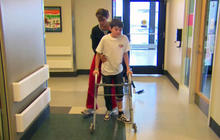Paralyzing illness is striking more U.S. kids
A rare condition that causes paralysis is on the rise in American children,
health officials reported this week.
“We do have an uptick in cases of acute flaccid myelitis in
2016. Fifty confirmed cases reported to us in 24 different states,” Centers for
Disease Control and Prevention pediatrician Dr. Manisha Patel told CBS News.
Ninety percent of those cases are in children, said Patel, the acute
flaccid myelitis team lead at the National Center for Immunization and
Respiratory Diseases at the CDC.
More commonly referred to as AFM, health officials said it can occur as a result of a variety of germs including enteroviruses, West Nile virus and adenoviruses. It affects the nervous
system, primarily the spinal cord, and its symptoms are likened to those caused by polio (which was eradicated in the U.S. thanks to the polio vaccine).

CDC: Don’t use nasal spray flu vaccine
A government panel of experts says the nasal flu vaccine failed to protect children from the virus for the last three years and is urging people …
In the second half of 2014, the
CDC received an increase in reports of AFM across the United States – 120 cases
between August and December that year. In 2015, the number of cases dropped to 21, but now they’re
back up again.
“The CDC is concerned about the increase in cases, so we’re
actively investigating the cases and working really closely with health
departments on it. We’re intensifying our efforts to find out what causes it – we don’t know what causes it,” said Patel.
Sudden limb weakness is a telltale sign of the illness, said Patel.
“Children present pretty acutely within the first couple of days,” she explained,
saying a limp might signal the condition.
In addition to weakness and loss of muscle tone and reflexes,
some patients may experience difficulty moving their eyes, drooping facial
muscles and eyelids, difficulty swallowing and slurred speech. Urination may be
difficult. The most severe symptom of AFM is respiratory failure if the muscles
involved in breathing weaken.
Scientists at the CDC are testing blood, nose, respiratory, and spinal
cord specimens from patients to learn more and try to identify the source.
“We are looking at it quite broadly to better understand
what might be causing it and why kids are coming down with this,” Patel said.
While cases are on the rise, Patel noted that AFM is still very rare,
affecting less than one in a million people.

After Enterovirus, boy learns to walk again
What seemed like a simple cold turned into paralysis for 13-year-old Dan Dugan, who has been in rehab since early October. The Seabrook, New Hamp…
Dr. Michael Grosso, medical director and chief medical
officer at Northwell Health’s Huntington Hospital, in Huntington, New York, told
CBS News, “It has been known for many years that although polio viruses are historically
most associated with that neurologic problem [paralysis], there are a number of
other viruses still in circulation that can produce a polio-like picture.”
He said the fact that recent cases have occurred in 24 different states
suggests that it may not be an outbreak of a single kind of infection.
“It could just be variation in the number of individuals
experiencing a rare complication of more than one viral infection,” said
Grosso.
To help reduce the risk, experts recommend parents take steps to provide their
children with good overall preventive health care.
“We need to do everything we can to reduce risk from those infections
for which we have preventive strategies,” said Grosso, including giving
children required vaccines.
“Many children are at risk for complications that are just
as severe as those from AFM from infections we can prevent, beginning with
influenza, but also other diseases,” Grosso added.
Patel said basic hygiene is important, too. “Until we better
understand this, we are asking parents to remain vigilant, practicing hand washing procedures with soap and water.”
Using insect repellents to prevent mosquito-borne illnesses
is important, too, she said.
Grosso said, “This is a very rare condition, but you never
want it to happen to your kid. There are a lot of things we can worry about. The
question is what we choose to worry about.”